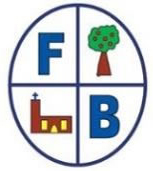Staying safe online
Being safe online is a critical skill that children need to learn.
We foster a safe online school environment by teaching e-safety through collective worship as well as through our computing and PSHE lessons.
|
|
|
Autumn |
Spring |
Summer |
|
E safety |
Reception |
What should you do if something you see or hear online makes you feel worried, scared or sad? |
How do we keep ourselves safe online? What rules should we follow to stay safe? |
When and where should you go to get help if you feel concerned? How do we keep information safe? |
|
Year 1 |
How do you keep personal information private? Why do websites want personal information? |
Where can you go for help and support when you are concerned?
|
What are the dangers of sharing photos online? |
|
|
Year 2 |
How do we keep personal information safe? |
Can we trust everything we find on the internet? Why is it important to be responsible on the internet? |
Where can you go for help and support when you are concerned? |
|
|
Year 3 |
How do you identify online dangers, including people are not who they say they are and the dangers they pose? What should you accept? |
How do you identify online dangers, including people are not who they say they are and the dangers they pose? How do we stay safe online and SMART? |
How do we communicate and share content online safely, responsibly and respectfully? What should we keep safe and private? |
|
|
Year 4 |
How do you identify online dangers, including people are not who they say they are and the dangers they pose? Who and what should I trust? |
How do you identify online dangers, including people are not who they say they are and the dangers they pose? Where can you go for help and support when you are concerned? |
How do we use technology safely, respectfully and responsibly? How do we recognise acceptable/unacceptable behaviour? How can we identify a range of ways to report concerns about content and contact? |
|
|
Year 5 |
How do we keep personal information private? Do we understand the consequences of sharing photo/videos online? How and where and who can we report concerns we have to? |
How can we check online content is trustworthy? How and where and who can we report concerns we have to? |
How do we keep personal information private? Do we understand the consequences of sharing photo/videos online? How and where and who can we report concerns we have to? |
|
|
Year 6 |
How do we respect others and protect ourselves against online bullies? |
How do we keep personal information private? How do we respect others and protect ourselves against online bullies? How and where and who can we report concerns we have to? |
How do we respect others and protect ourselves against online bullies? How and where and who can we report concerns we have to? |
Safer Internet Day: Every year the school gets involved in this global event to help inspire conversations about using technology responsibly, respectfully, critically and creatively.
USEFUL WEBSITES
Internet Matters - Age specific advice for staying safe online from a not-for-profit organisation that has a simple purpose - to help keep children safe in the digital world
CEOP: For concerns about online sexual abuse or the way someone has been communicating online
NSPCC Net Aware: A guide to the social networks and online games that children use
Childline: 0800 1111 - A 24 hour free helpline service for children and young people
National Online Safety – Helpful guides to a range of apps and online websites and games sharing safety tips and what parents need to know
Think U Know - the education programme from NCA-CEOP, a UK organisation which protects children both online and offline
Click here to find out more about National Online Safety Mobile App.
